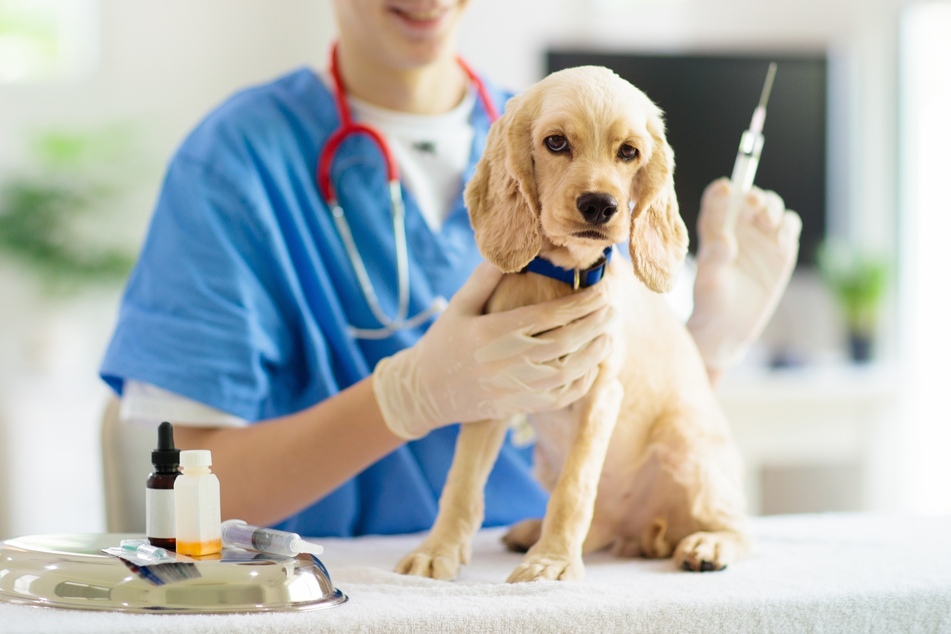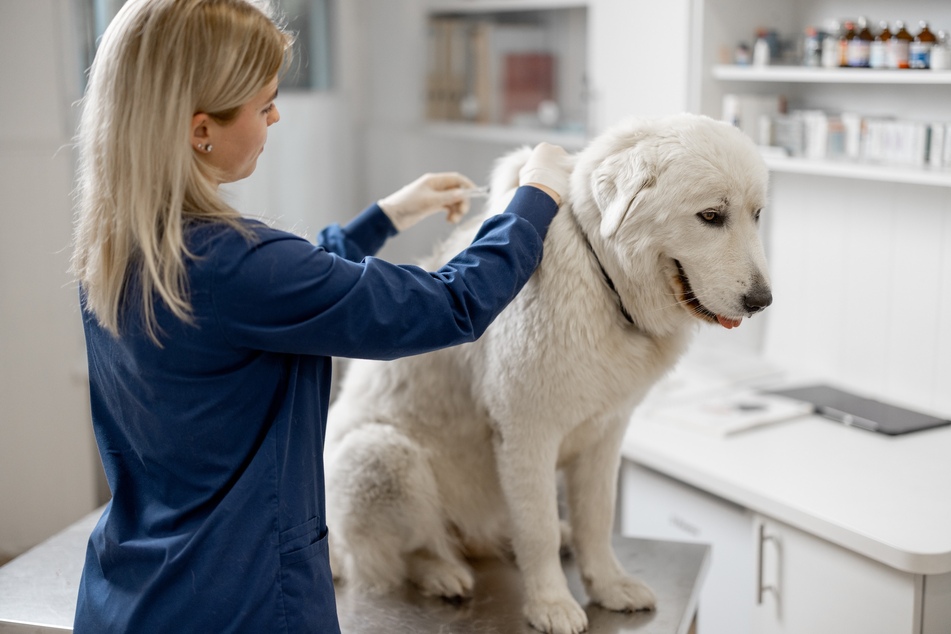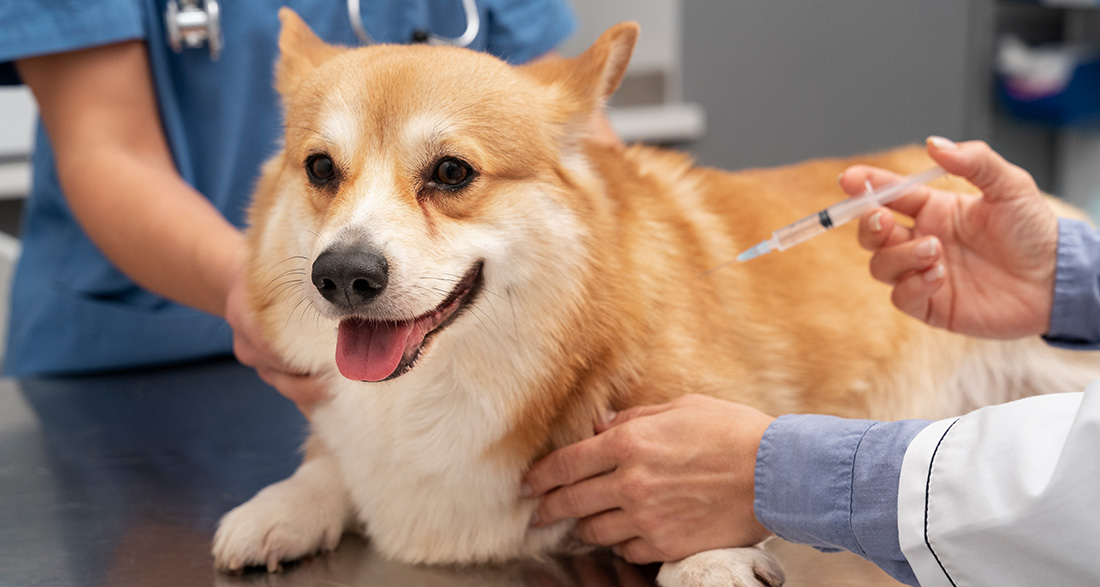Dogs bring a lot of joy into the lives of their owners. To ensure that this continues, they should receive the necessary health care, including vaccinations. However, there are exceptions.
For many dog owners, deciding to vaccinate their dog is a weighty decision. Just like in humans, each body reacts differently to vaccines.
Vaccinations can protect the beloved furry friend from dangerous infectious diseases – that’s clear.
But under certain conditions, the decision should not be taken lightly.
When is the brief jab right for the dog? How often should a dog be vaccinated and against what?
iHugDogs informs you about what you should know about dog vaccinations and what needs to be carefully considered.
Important Information about Vaccinations in Dogs
Just like in humans, your dog’s immune system can defend against pathogens only if it has learned to fight them. For this to happen, the dog’s body needs to come into contact with pathogens – in small amounts, of course. Only then can it learn to recognize and successfully combat bacteria, fungi, and viruses.
To prepare the dog’s immune system for these pathogens, they are injected through vaccination in weakened or killed form. This gives your dog’s immune system the chance to deal with these pathogens and produce antibodies against them.
The result: Your dog develops a kind of shield against the actual disease.

Strongly Recommended Dog Vaccinations
If you want to vaccinate your dog, you should first inform yourself about the essential vaccinations. Although there is no legal requirement for dog vaccinations in the United States, there are vaccinations strongly recommended by the AVMA (American Veterinary Medical Association). These are also called core vaccines.
These include vaccinations against:
- Rabies ($30)
- Parvovirus ($30)
- Distemper ($30 – $40)
- Leptospirosis ($30 – $40)
- Canine infectious hepatitis (CIH) ($35)
You can have your dog vaccinated against all these pathogens at once through a so-called complete vaccination (cost: $60 to $70).
Brief explanations of the most important dog vaccinations
Rabies:
Rabies is a highly dangerous disease – especially for unvaccinated dogs, it always ends fatally. The incubation period is two to ten weeks, depending on the location of the bite. If the bite is close to the brain, the first signs appear quickly. These include changes in behavior, paralysis, and aggression.
Due to the almost 100 percent mortality rate, dogs should always be vaccinated against rabies.
Parvovirus:
Parvovirus, also known as canine parvovirus, is a viral gastrointestinal disease. The virus is harmless to humans, but vaccination for dogs is highly recommended.
Distemper:
Distemper is a very dangerous and highly contagious viral disease that often ends fatally for dogs. Only rabies surpasses the likelihood of death for affected dogs after infection – worldwide.
Leptospirosis:
This is a contagious infectious disease that can affect dogs through contaminated waters. While bathing, dogs inadvertently swallow a lot of water and can ingest leptospires. Infection from dog to human is also possible.
Canine Infectious Hepatitis (CIH):
Canine infectious hepatitis (CIH) is a viral infection often involved in chronic liver inflammation in dogs. It is now rare but still poses a risk to furry favorites.
Additional Vaccinations for Dogs
To ensure the optimal protection of your four-legged friend during both foreign travels and individual life circumstances, there are additional crucial vaccinations for dogs that are worth closer consideration. These fall under the category of so-called non-core vaccinations.
Leishmaniasis:
Vaccination against leishmaniasis is considered a travel vaccination for dogs. If you plan to travel to vulnerable areas such as Spain, Portugal, or France, this vaccination is recommended to adequately protect your furry companion.
Canine Herpesvirus:
Pregnant female dogs, in particular, are often vaccinated against the canine herpesvirus to minimize puppy mortality in breeding.
Bordetella bronchiseptica & Canine Parainfluenza Virus 1 – Kennel Cough:
These pathogens are part of the kennel cough complex. Vaccination is predominantly recommended for dog owners who have adopted their canine from an animal shelter, plan to place them in a dog kennel, or wish to integrate them into a puppy playgroup.
Borrelia burgdorferi and Babesia canis:
These pathogens can be transmitted by ticks and damage the dog’s nervous system. Vaccinations are mostly recommended only in high-risk areas. In the United States, a tick collar or so-called spot-on sprays can contribute to sufficient tick protection.
What to Consider in Dog Vaccination?

If you want to vaccinate your dog, they must be in overall good health and fitness at the time of vaccination, as sick dogs generally cannot be vaccinated.
To minimize the risk of potential vaccination side effects, your dog should be healthy, dewormed, and free from parasites.
Before vaccination, you can subject your dog to a comprehensive veterinary health check. This way, the veterinarian evaluates the animal’s health and can give the green light.
If your dog shows symptoms such as fever, diarrhea, or other signs of illness, these must be treated first. If you are uncertain, always clarify this in advance with your veterinarian and have your faithful companion examined first.
After vaccination, rest and recovery are essential for your furry friend. Because their immune system will be working at full capacity in the following hours, facing a significant challenge.
How often should dogs be vaccinated?
Vaccination intervals depend on the vaccine, the vaccine manufacturers, and the dogs themselves. While vaccines against viruses often need renewal only after three years, vaccines against bacteria usually need to be refreshed after 12 months.
Primary Immunization – Important Vaccination for Puppy Dogs
Your dog’s primary immunization includes essential core vaccines. These vaccines are administered several times at intervals of a few weeks, ensuring the necessary development of immune defenses. Primary immunization should begin from the eighth week, but no later than the 12th week of the dog’s life. The vaccination is repeated after four weeks, and the primary immunization is then complete.
A booster shot is recommended after one year.
Booster Vaccinations for Dogs
Many veterinarians recommend an annual booster vaccination against leptospirosis, hepatitis, and distemper pathogens. These three vaccines are available as a combination vaccine, requiring only one injection.
Parvovirus, on the other hand, only needs to be refreshed every two to three years, and rabies only every three years.
Important for all vaccinations – including boosters – is always that your dog is healthy and in a trusting veterinarian-patient relationship.
Possible Side Effects of Vaccination in Dogs

All vaccines applied in the United States are tested for their compatibility. However, side effects can occur.
These include:
- Fatigue
- Fever
- Gastrointestinal complaints
- Vaccine bump (swelling at the injection site)
These symptoms should subside in one to two days. If this is not the case, you should consult your veterinarian again for clarification.
In rare cases, there are so-called vaccine breakthroughs. This occurs when the disease against which the vaccination was given still breaks out. Such vaccine damage can occur if bacteria enter the dog’s body or if the injection was administered improperly. The consequences can be abscesses or inflammations.
Fortunately, such side effects occur very rarely. If you notice any changes in behavior or visible physical changes in your dog, consult your veterinarian immediately.
When should dogs not be vaccinated?

In some cases, vaccination of the dog is not recommended. If the furry friend is in poor health, vaccination must be postponed – regardless of age and gender.
Furthermore, dogs should not be vaccinated if:
- They are younger than eight weeks old
- They have pre-existing conditions (all risks should be discussed with the veterinarian)
- The immune system is significantly weakened (also in chronic illnesses)
- The dog is currently suffering from other diseases, such as mite infestation (which must be treated medically first)
- The female dog is pregnant
In pregnant females, vaccination can lead to changes in hormone levels and adversely affect the immune response.
By the way, you can have a titer test performed on your dog, providing information on whether the immune system still has sufficient antibodies. This way, your hairy friend may be spared a vaccination interval while still enjoying adequate protection. This test costs about $60.
Conclusion: Should I vaccinate my dog, yes or no?
Never before have vaccinations been so much in focus as they are now. Due to the COVID-19 pandemic, we regularly discuss vaccinations because they are fiercely debated both in social circles and in the media.
Vaccinations for dogs also polarize, as the fear of vaccine damage is omnipresent. Whether you want to and will vaccinate your dog is solely your decision. While there is no legal obligation for vaccinations in the United States, if you plan to travel abroad with your canine companion, some vaccinations may become mandatory.
Discuss your concerns and fears with your veterinarian, and be thoroughly informed about everything you need to know. The fact is, vaccinations can support the health of your dog.


